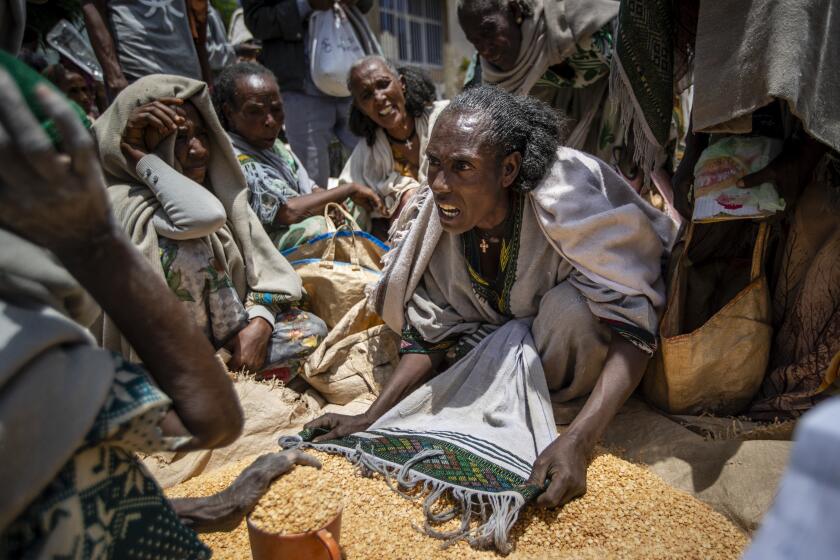Ethiopia declares immediate, unilateral cease-fire in Tigray

- Share via
NAIROBI, Kenya — Ethiopia’s government on Monday declared an immediate, unilateral cease-fire in its Tigray region after nearly eight months of deadly conflict and as hundreds of thousands of people faced the world’s worst famine crisis in a decade.
The cease-fire could calm a war that has destabilized Africa’s second-most-populous country and threatened to do the same in the wider Horn of Africa, where Ethiopia has been seen as a key security ally for the West. It came as the country awaited the results of national elections that Prime Minister Abiy Ahmed promoted as the centerpiece of reforms that won him the 2019 Nobel Peace Prize.
Abiy’s transformation from making peace to waging war has appalled many observers since the fighting in Tigray erupted in November. Since then, the world has struggled to access much of the region and investigate growing allegations of atrocities including gang rapes and forced starvation.
Ethiopia’s statement was carried by state media shortly after the Tigray interim administration, appointed by the federal government, fled the regional capital, Mekele, and called for a cease-fire on humanitarian grounds so that desperately needed aid could be delivered. Meanwhile, Mekele residents cheered the arrival of Tigray forces.
The cease-fire “will enable farmers to till their land, aid groups to operate without any military movement around and engage with remnants [of Tigray’s former ruling party] who seek peace,” Ethiopia’s statement said, adding that efforts to bring Tigray’s former leaders to justice continue.
Ethiopia said the cease-fire would last until the end of the crucial planting season in Tigray. The season’s end comes in September. The government ordered all federal and regional authorities to respect the cease-fire — crucial as authorities and fighters from the neighboring Amhara region have been accused of atrocities in western Tigray.
More than 350,000 people face famine in Ethiopia, the United Nations says. It is not just that people are starving; it is that many are being starved.
“The government has the responsibility to find a political solution to the problem,” the head of the interim administration, Abraham Belay, said in calling for the cease-fire, adding that some elements within Tigray’s former ruling party are willing to engage with the federal government.
There was no immediate comment from the Tigray fighters, with whom Ethiopia had rejected talks. And there was no immediate comment from neighboring Eritrea, whose soldiers have been accused by Tigray residents of some of the worst atrocities in the war.
Thousands of people have been killed in the conflict as Ethiopian and allied forces pursue Tigray’s former leaders and their supporters, and as humanitarian groups plead for more access to the region of 6 million people.
The region in recent days has seen some of the fiercest fighting of the conflict. International pressure on Ethiopia spiked again last week after a military airstrike on a busy market in Tigray killed more than 60 people.
Amid the upheaval on Monday, the United Nations children’s agency said Ethiopian soldiers entered its office in Mekele and dismantled satellite communications equipment, an act it said violated the world body’s immunity. UNICEF last week warned that at least 33,000 severely malnourished children faced “imminent risk of death” without more aid reaching Tigray’s people.
More to Read
Sign up for Essential California
The most important California stories and recommendations in your inbox every morning.
You may occasionally receive promotional content from the Los Angeles Times.











